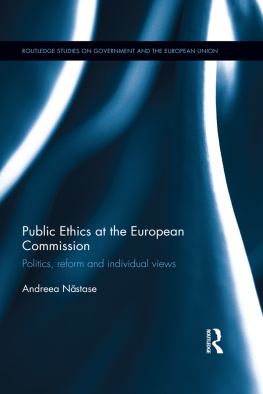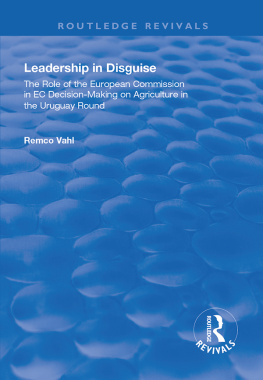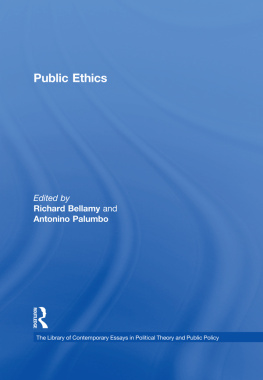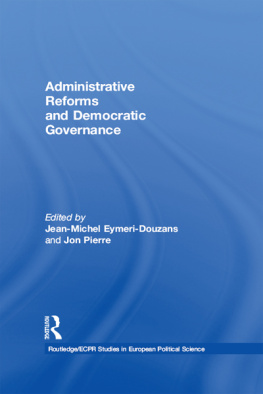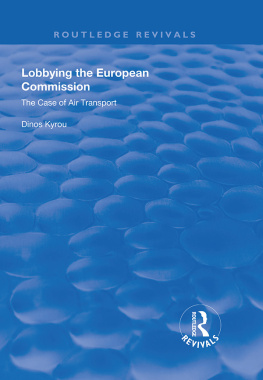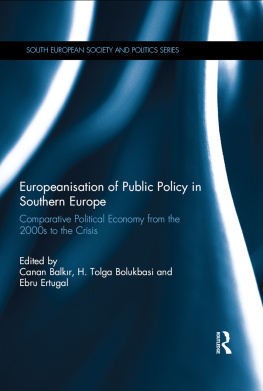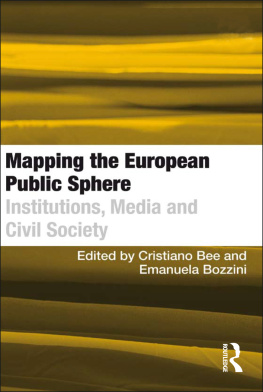Public Ethics at the European Commission
Since the early 2000s, reforms in the area of public ethics have represented a significant part in the European Commissions efforts to improve its internal governance and democratic legitimacy, and address the crisis of public confidence in European integration.
This book comprises a study of ethics and public integrity issues in the administrative services of the European Commission. The author traces the reforms implemented in this area since the early 2000s, and asks whether and how they have shaped Commission officials thinking about appropriate behaviour in public office. Based on in-depth interviews and the use of vignettes, the book reveals that the influence of ethics regulations is subtle and full of contradictions: while a heightened awareness and discussion of ethical issues exists in the Commission nowadays, the topic is nonetheless often considered as a matter of common sense. This book breaks new ground as the first analysis of ethics at the level of individual EU officials. It advances a new angle to the study of the Commission as an administrative actor, and sheds light on an important but under-researched component of its efforts to address criticism concerning democratic legitimacy. In the field of administrative ethics, the book tackles research gaps regarding the practice and impact of ethics policies within public organizations.
This text will be of key interest to scholars, students and practitioners of EU Studies/Politics, institutional reform, administrative ethics, and more broadly European governance and public policy.
Andreea Nstase is Assistant Professor in European Public Policy at Maastricht University, the Netherlands. She holds a PhD from the Central European University, Budapest.
Routledge Studies on Government and the European Union
Edited by Andy Smith,
University of Bordeaux, France
1 The European Council and European Governance
The commanding heights of the EU
Edited by Franois Foret and Yann-Sven Rittelmeyer
2 The EUs Government of Industries
Markets, institutions and politics
Edited by Andy Smith and Bernard Jullien
3 Policy change in the Area of Freedom, Security and Justice
How EU institutions matter
Edited by Florian Trauner and Ariadna Ripoll Servent
4 The Mechanisms of Institutional Conflict in the European Union
Ludvig Norman
5 Public Ethics at the European Commission
Politics, reform and individual views
Andreea Nstase
First published 2017
by Routledge
2 Park Square, Milton Park, Abingdon, Oxon OX14 4RN
and by Routledge
711 Third Avenue, New York, NY 10017
Routledge is an imprint of the Taylor & Francis Group, an informa business
2017 Andreea Nstase
The right of Andreea Nstase to be identified as author of this work has been asserted by her in accordance with sections 77 and 78 of the Copyright, Designs and Patents Act 1988.
All rights reserved. No part of this book may be reprinted or reproduced or utilised in any form or by any electronic, mechanical, or other means, now known or hereafter invented, including photocopying and recording, or in any information storage or retrieval system, without permission in writing from the publishers.
Trademark notice: Product or corporate names may be trademarks or registered trademarks, and are used only for identification and explanation without intent to infringe.
British Library Cataloguing in Publication Data
A catalogue record for this book is available from the British Library
Library of Congress Cataloging-in-Publication Data
Names: Nastase, Andreea, author.
Title: Public ethics at the European Commission : politics, reform and
individual views / Andreea Nastase.
Description: Abingdon, Oxon ; New York, NY : Routledge, 2017. | Series:
Routledge studies on government and the European Union ; 5 | Includes
bibliographical references and index.
Identifiers: LCCN 2016015213 | ISBN 9781138203785 (hardback) |
ISBN 9781315470573 (ebook)
Subjects: LCSH: European CommissionEthics. | European
CommissionOfficials and employees. | Political ethicsEuropean
Union countries.
Classification: LCC JN33.5 .N374 2017 | DDC 172/.4094dc23
LC record available at https://lccn.loc.gov/2016015213
ISBN: 978-1-138-20378-5 (hbk)
ISBN: 978-1-315-47057-3 (ebk)
Typeset in Times New Roman
by Apex CoVantage, LLC
Throughout this research project I received a great deal of intellectual and personal support, for which I express my deepest gratitude. First and foremost, I would like to thank Agnes Batory, who served as my PhD supervisor, and offered me outstanding guidance and continuous support over the years. Her feedback was always spot-on, constructive, and timely, and she allowed the intellectual space for my ideas to grow. I am also very grateful to Uwe Puetter for the thorough discussions and the input he has constantly provided, and to Nenad Dimitrijevic, whose observations have helped me navigate some thorny conceptual problems. I am forever indebted to the extraordinary people at the Department of Public Policy at the Central European University in Budapest, who have provided me with a nourishing intellectual home as a PhD student.
This project has been advanced in important ways through several research visits I undertook in Leuven, Maastricht, and Amsterdam. I owe my thanks for their hospitality and input to: Jeroen Maesschalck, Kim Loyens, Aneta Spendzharova, Thomas Conzelmann, Gjalt de Graaf, Annelies De Schrijver and Christoph Demmke. I am also very grateful to Sophie Vanhoonacker and Thomas Christiansen, who have supported this book from the beginning and provided valuable advice and encouragement through what has sometimes been a difficult process. I am furthermore grateful to the anonymous reviewer for very helpful and insightful comments, to Andy Smith, for his valuable and very timely help in putting the finishing touches on the manuscript, and to the editorial team at Routledge for their assistance. This book has benefited enormously from Michelle Cinis pioneering work on ethics in the European Commission. I thank Michelle for her constant support and for all our discussions, and especially for the first meeting in Bristol, which, to me, was very motivating and inspiring.
This book would not have been possible without the involvement of EU public officials. Although they must remain anonymous, I would like to thank all my interviewees for their time and openness, and for the many wonderful insights offered during our interviews. The time I spent walking the European quarter in Brussels was truly exceptional.
I am very grateful to all my friends and colleagues at the Central European University and the Faculty of Arts and Social Sciences at Maastricht University, who have made those past few years into a great experience. Special thanks is due to several people who have not only commented on my work, but also patiently supported me through the ups and downs of the research and writing process: Sara Svensson, Stefan Cibian, Elene Jibladze and Oana Lup. I am also much obliged to Teodora Danes and Adrien Elleboudt for their hospitality during my successive research trips to Brussels.
I would also like to express my gratitude for the financial and administrative assistance provided by the Central European University and the University of Maastricht.

